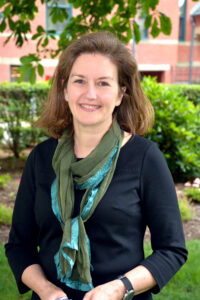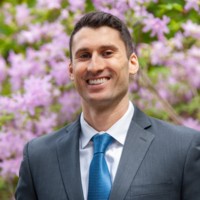Spotlight: BUSM Student Affairs Office
Advocating for medical students, providing career guidance and seeking ways to boost mental and emotional health are just some of the ways that the 13-member team in the BUSM Student Affairs Office (SAO) supports medical students to ensure each receives the assistance they need to succeed.
More than academics
The SAO helps students through personal issues, provides direction for the 80-plus student activity groups, shepherds students through the Match process and works with fourth-year students on interview preparedness, among a variety of other responsibilities.
 Seven assistant deans and five staff members comprise Student Affairs, under the leadership of Associate Dean for Student Affairs Angela Jackson, MD, who also is an associate professor of medicine.
Seven assistant deans and five staff members comprise Student Affairs, under the leadership of Associate Dean for Student Affairs Angela Jackson, MD, who also is an associate professor of medicine.
While assistant deans are physically “in the office” varying amounts of time each week, they always are available to connect with students who need assistance.
“The role of student affairs is one that never goes away,” Jackson said, referring to herself and her team. “You’re never off the clock.”
In January, Pedro Falci joined the staff as Director of Student Affairs after eight years on the Charles River Campus.
 “It’s my job to provide students the resources they need to feel grounded and connected to the BUSM community so they can approach their medical education with confidence,” Falci said. “A pandemic doesn’t change that, and I am proud of our whole team’s dedication to being there for our students.”
“It’s my job to provide students the resources they need to feel grounded and connected to the BUSM community so they can approach their medical education with confidence,” Falci said. “A pandemic doesn’t change that, and I am proud of our whole team’s dedication to being there for our students.”
Meeting students where they’re at
The path to medical school is different for every candidate, as students bring with them a variety of life experiences. As they move through the four years of school, their needs and concerns change. An integral part of the Student Affairs mission is to meet students where they’re at the different stages of their personal and professional development.
“A first-year student is navigating how to survive in medical school, and just beginning to explore career options. Learning to thrive and actually enjoy the process may come a little later,” Jackson explained. “A fourth-year student is getting ready for the next phase of their career when they’re walking out of here as physicians, able to write prescriptions and make decisions. The needs are very different, and that is something that we have to be really aware of when we’re talking to a student.”
A passion for medical education
Jackson has spent her entire professional life in medical education. She first got a taste for the administrative side of education working as a chief resident at Boston City Hospital, which later merged with University Hospital to become Boston Medical Center. Then, she was a program director for the primary care residency training program in internal medicine, and developed curriculum in caring for underserved patients.
After transitioning into the BUSM Student Affairs role, she was surprised to learn that she liked working with students even more than working with residents.
“It’s really amazing, because the students I work with are going to go out and teach more generations of medical students who will care for more patients. It’s like a pebble in a pond,” she said. “Those ripples just keep going out. If I can help somebody or teach them something, they’re going to go out and spread it further.”
Adapting to COVID-19
Jackson noted that her daily routine changed enormously when the COVID-19 pandemic began. Typically, students are able to drop into the office, even sans appointment, to chat and get help whenever they need it.
“The loss of casual visits hit us really hard,” Jackson said. “When I’m in the office, my door is always open, so if a student wants to stick their head in and say ‘Hey, can I talk to you?’ The answer is ‘Yes, come on in.’ And we lost that in the pandemic.”
Still, like other departments on the Medical Campus, SAO learned new ways to adapt and serve students remotely, with offerings like virtual office hours and town halls.
The White Coat ceremony, orientation, Match Day and commencement are all staples of the medical school experience, and typically are celebratory in-person gatherings. Student Affairs worked diligently to make sure that all of these events were still meaningful for students, despite the sting of not being able to gather and be with each other in person due to the pandemic.
With in-person classes and clerkships going virtual, the Office also realized that unstable internet was an issue for many medical students getting ready for virtual residency interviews, and they jumped into problem solving mode once again. Working with faculty and Instructional Media, they were able to identify available office space to be repurposed as virtual interview space for students (with the necessary COVID-19 protocols in place).
The PATH through medical school
The SAO is also responsible for the advising program. After input from students and faculty, Jackson reimagined advising as a role linked to teaching clinical skills and relationship development. In collaboration with the Medical Education Office, this new model developed into the Academy of Medical Educators, where faculty are involved in advising and coaching in small group and one-on-one sessions, along with clinical skill development. Advising time, including life and career guidance, is now built into the curricular schedule.
A few years ago, SAO organized their office into PATH, which contains different “buckets” of professional development. The acronym stands for Professional Identity Formation, Advancing to Residency through Mentoring and Advising, Techniques for Lifelong Learning Resiliency and Wellness, and Humanism and Advocacy.
PATH provides a flexible framework for the SAO to guide students and help them track their progress, set goals, capture experiences, reflect, plan for next steps and more. According to Jackson, this all falls under the umbrella of student wellbeing. “It’s about the whole student—not just academic support, but wellness activities, financial services, learning resilience and balance, and more,” she said.
“I think the most rewarding thing for us in Student Affairs is that the students themselves are amazing individuals—they are smart, talented, dedicated and resilient,” Jackson said. “They come from so many different backgrounds with such richness of life experience. Some of them are straight out of college, some folks are coming into medicine from another career, and they bring those perspectives. They are what makes our job so great.”
View all posts